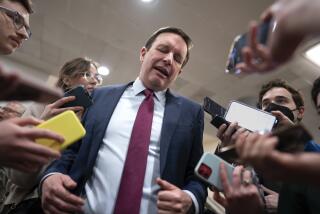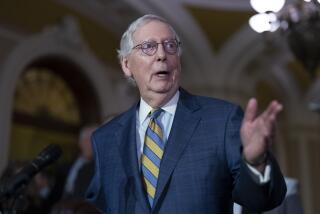Mitchell, Dole Dig In Over Health : Senate: Appearing side by side, the men spar over merits of Democratic bill. The GOP leader concedes a compromise may be possible but doubts that the votes are there.
- Share via
WASHINGTON — The Senate’s Democratic and Republican leaders dug in their partisan heels on health care reform Sunday, further dimming prospects for completing legislation this year.
Appearing on NBC-TV’s “Meet the Press,” Senate Minority Leader Bob Dole (R-Kan.) vowed that Republicans would not support a government-run health care system of the sort he said Senate Democrats had proposed.
“Is there opportunity for compromise?” Dole asked. “Maybe.” But then he added: “I don’t believe anybody has the votes” to move a health care package through the Senate.
Senate Majority Leader George J. Mitchell (D-Me.), appearing on the same show, denied that his bill, a substantially scaled-back version of President Clinton’s universal coverage measure, constituted a government-run program. Besides, he said, Republicans already support massive government health programs, including Medicare, and all senators are covered by a government-run system that pays 72% of their premiums.
Dole denied that Senate Republicans are filibustering on the Mitchell bill. The full Senate began debating Mitchell’s version Tuesday but, after five days, had not taken a single vote. Dole said voting on proposed amendments should begin this week.
“You’ll be able to determine if and when Republicans ever adopt . . . a posture where we are delaying a bill just for delay’s sake,” Dole said.
Mitchell acknowledged that his bill’s provisions for 95% coverage by the year 2000--about 85% of the population has health insurance now--would mean that health care would absorb one-fifth of the domestic economy in a decade, versus one-seventh now. But the Congressional Budget Office estimates that health care will account for nearly that much of the economy even without any changes in the current system.
“My plan provides that for the same cost, we bring into the system more than 30 million people, so I think it’s a significant accomplishment,” Mitchell said.
Dole insisted that it would be politically acceptable for Clinton, who has underscored the importance of universal coverage, to sign a compromise health measure that stops considerably short of that objective.
If Congress passes a health care bill, “he’ll probably sign it,” Dole said. “He may suggest that this is not what I wanted, but this does help millions of people. It helps them this year. Why put off helping people?”
Meanwhile, Democratic Sen. David L. Boren of Oklahoma pronounced the Mitchell bill “dead,” adding: “I think we can’t even amend it. I think we have to start over.”
Appearing on CBS-TV’s “Face the Nation,” Boren said the majority leader’s bill had so many government price controls and provisions for employers to pay for coverage “down the road” that it was supported by “perhaps” only one Republican. “That shows there’s no hope of bipartisanship there.”
Boren called for working on a more limited measure that “can be a first step, that can really be bipartisan.”
But Sen. John B. Breaux (D-La.) said on the same program that he thought the Mitchell bill could be passed with eight to 10 amendments.
“Sen. Mitchell’s bill has moved towards the center,” Breaux said. “I think with some additional amendments it can be a package that can pass the Senate and, I think, pass the House.”
Rep. Newt Gingrich of Georgia, the House Republican whip, said “a small” health care bill could pass the House this year, but not one that guarantees universal coverage. “I can’t imagine a left-wing, big-government” health bill passing, he said on ABC-TV’s “This Week With David Brinkley.”
More to Read
Get the L.A. Times Politics newsletter
Deeply reported insights into legislation, politics and policy from Sacramento, Washington and beyond. In your inbox twice per week.
You may occasionally receive promotional content from the Los Angeles Times.










